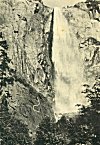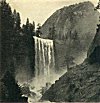
Sacred Texts Native American California Index Previous Next


Click to enlarge
BRIDAL VEIL (OR POHONO) FALL

Click to enlarge
VERNAL FALLS (PI-WY-ACK)
Photo H. C. Tibbitts
IT WAS the belief of the Indian that in the beginning the Coyote-man made the world. Then taking the Frog-man with him he set out on a raft into the east. When they reached here the Coyote-man told the Frogman to dive down and bring up some earth, which he did.
[paragraph continues] From the earth that the Frog-man brought up the Coyote-man made the land. Then from the home of the Coyote-man and the Frog-man came other people, the Lizzard-man, the Cougar-man, the Fox-man, the Fish-man, the Star-woman, the Grizzly-bear-woman, and many others. The Coyote-man was a witch doctor of great power, and after he had made the land so that it was good, he decided to make a perfect people to live on it. The Coyote-man wanted to make these people like himself, but the Lizzard-man said that it would never do to make people with paws like the Coyote-man as they would not have fingers with which to take hold of things. This suggestion made the Coyote-man very angry and he jumped at the Lizzard-man who ran and hid in the rocks. Then they argued for a long time and the Coyote-man finally agreed that the people should have a hand with five fingers like the Lizzard-man. They then decided that as the world was dark and cold there must be light and there must be fire. So the Little-white-footed-mouse was sent to a far away land to steal the fire, which he succeeded in doing. While being pursued by the Valley-people from whom he had stolen the fire the Little-white-footed-mouse, afraid of being caught, hid the fire in the buckeye and cedar trees. From there some of the fire shot up into the sky and became the sun, so there was light and heat, but some of it remained in the trees, and ever since the people have known that by rubbing the sticks of the buckeye or cedar together, they could make fire.
When the Coyote-man had the land all finished and was ready to make the people, he went all over the land and at each place where he wished the people to live, he stuck into the ground two sticks. At the same time he gave the places a name. When he had the sticks all put out and the places all named, he turned the sticks into men and women. The Coyote-man then told the Lizzard-man and the others that they must all turn into animals, which they all did. The Coyote-man became the coyote, and because he had never quite forgiven the Lizzard-man for persuading him to make the people with hands and five fingers, to this day he hunts and kills the lizzard whenever he can find him. The Grizzly-bear-woman became the grizzly bear and carried with her into her new state her fondness for acorns. The Cougar man changed into the cougar and still possesses the power to hunt and kill the deer just as he did before. The Fox-man became the fox and his skill as a hunter is just as great as before. The Frog-man became the frog and still retains his fondness for jumping into the water. The Lizzard-man became the lizzard and to this day still has the habit of running and hiding in, the rocks. The Star-woman, because of her fondness for the bright abalone shells, was changed into the stars. The Fish-man became a fish and still makes his home in the water. And so they all became the animals and birds and flowers that are around us even yet.
When the people that the Coyote-man had made woke up and looked upon the world they found it good. They
learned by watching the animals what articles were good to eat. From the grizzly bear they learned that the acorn was food. From the crane they learned to catch and eat the fish. The cougar taught them that the meat of the deer, the elk, and the antelope was to be eaten. They gained wisdom from experience, by observing how the animals and birds and bugs lived. They multiplied and grew strong and built villages, even as the ants. They were happy and worshipped The Great Spirit who had given them life, and the sun which kept them warm. And in time, out of the natural conditions surrounding them, and the accumulated wisdom of the ages, they slowly evolved a system of habits and customs, certain methods of collecting and preparing food, certain religious beliefs, and certain ideas of government.
All of the people who lived in the region of what is now known as the Yosemite Valley, were more or less related by blood or intermarriage, and their customs, religious beliefs, and characteristics were more or less curiously intermingled as a result thereof. What is said here will be generally understood to apply to all of them, although there were of course, differences, due, in most cases, to environment. In fact, as is true in the case of all the Indian tribes, their mode of living, their food supply, and even their habits and customs, were the outcome of the natural conditions surrounding them such as climate, available food supply and so on. From now on my story deals only with that tribe of Indians who lived in the Yosemite Valley, and who later came to be known as the Yo-sem-i-tes.